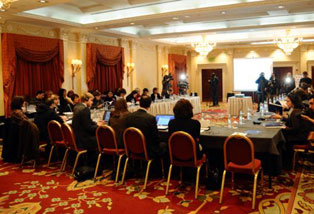Nino Tarkhnishvili, Radio “Liberty”
The Georgian advertising sector is characterized by a lack of competition and strong concentration of the market; the researchers of the TI-Georgia evaluated the Georgian advertising market as monopolized and suggest governmental institutions to refrain from interference in the functioning of media and advertising market.
The research was presented on December 13; journalists and media experts worked on the research. Administration of the monopolist advertising company and chair of the Georgian National Communication Commission were invited to the presentation; however they did not attend the event in the Hotel Tbilisi Marriot.
The research of the Georgian Advertising Market was carried out in the framework of IREX G Media program with the financial support of the USAID. The researchers of the TI Georgia concluded that the Georgian Advertising Market is monopolized after they had studied the market in Georgia.
To verify their allegations, the organization did not avoid naming concrete monopolists. One of them is advertising sales house “General Media.” The researchers indicate that before the end of 2010, there were two dominating sales houses in Georgian TV advertising market. One of them was Touch Media, part of the Imedi Holding Company “Georgian Media Production Group.” The director general of the Holding is Giorgi Arveladze. The second is “Media House” whose owner was chairman of the Georgian National Communication Commission Irakli Chikovani. In 2011 a new company “General Media” appeared in the market. It was established as a result of incorporation of actives of the two leading sales houses, the researchers state.
Mamuka Andguladze, media-analytic and an author of the research, noted that General Media cooperates only with those TV-Channels who are considered to be pro-governmental: “I would like to single out General Media. It exclusively cooperates with the Rustavi 2, Imedi and Mze. It also cooperates with the Public Broadcasting Company; however, the Company does not cooperate with the so-called pro-oppositionist channels.”
The research reveals that independent media sources, which highlight sensitive political events, face problems in attracting advertisements. The researchers stress out that in the private sector, a climate of self-censorship persists and many advertisers remain reluctant to cooperate with outlets that are known for their critical views, fearing negative consequences for their businesses.
Head of the TV-Company Kavkasia Nino Jangirashvili agreed with the conclusion of the researchers and mentioned their example. “Large advertisers are so much personally and financially integrated with governmental institutions that they already know their team-members and they are fully aware that they must not financially support the members of other teams. It results into a difficult environment for independent media which relatively loses chance for development. Short time ago, several dozen advertisers were summoned to the head of the department at the Financial Police and were warned not to order advertisements in “Kavkasia”.
Concerning the printed media and advertisements on their papers, we should pay particular attention to a separate chapter in the research Tabula versus Liberali.
The researchers state that news magazine Tabula, which is owned and edited by Tamar Chergoleishvili, the wife of Giga Bokeria, the head of the National Security Council, has had an impressive number of full-page ads. At the same time, its independent direct competitor, the weekly Liberali magazine with a largely similar target audience as Tabula, has been struggling to attract any advertising clients. In respond to the researchers’ assumption, reporter of the national politics for the Tabula Salome Ugulava stated that short time ago Research Company ACT carried out a survey of the advertising market for the Tabula whose results responded to the question why companies advertise their activities in the Tabula.
“Since you are comparing us with the Liberali, I would speak about this particular magazine: in this particular case, the prominence of the magazines is significant for advertisers. I would like to underline that the Tabula is much prominent and hopefully you will also agree with me that before ordering your advertisement to the magazine, you should know it very well,” said Salome Ugulava.
“Our knowledge relied on assumptions and rumors concerning the advertising market; this research enabled us to have concrete schemes, analysis and output according to what we can speak about ongoing situation in the Georgian advertising market,” journalist Ia Antadze evaluated the research after the presentation. “We should attentively read the report and think over the possible changes in this field that can have direct impact on news reporting policy. As for the prominence of different media outlets, I would like to bring an example of the TV-Company Maestro. I do not think more people know Tabula than Maestro-TV.”
Radio “Liberty” tried to get in touch with the sales house General Media, which is named to be a monopolist of the advertising market according to the media-researchers; however, apparently, the company does not have an online website and nobody responded phone calls either.
As for several important aspects of the research, it should be noted that Net advertising in 2010 was between USD 43 and 46.5 million. TV remains Georgians’ dominant source
of information on current events as well as the largest sector of the advertising market, accounting for 78% percent of all advertising spending. Radio accounts for about 7% of gross advertising spending, outdoor for about 6% and newspapers and magazines each for about 4% of total advertising spending.




